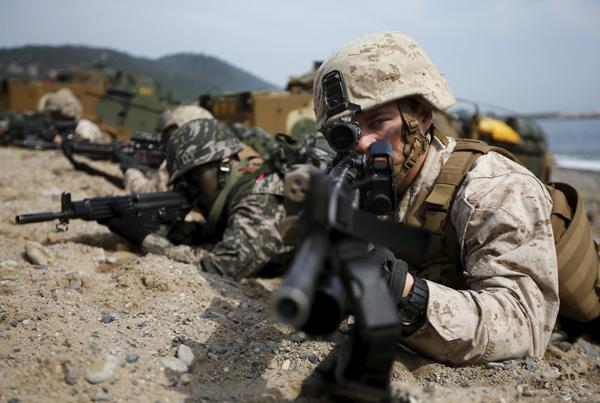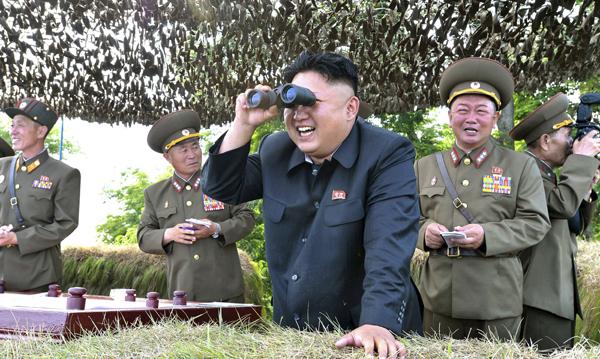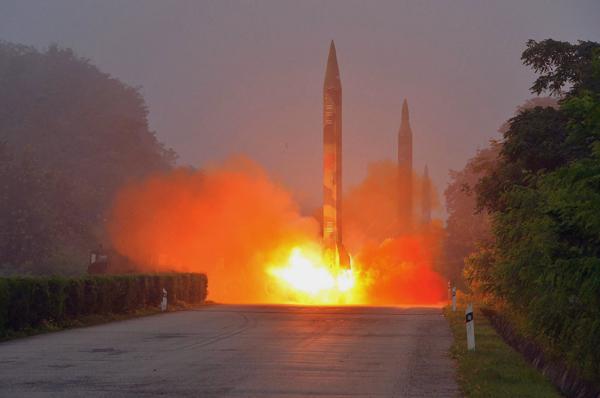You are here
North Korea threatens nuclear strikes over South-US military drills
By AFP - Mar 07,2016 - Last updated at Mar 07,2016

US and South Korean marines participate in a US-South Korea joint landing operation drill in Pohang, South Korea, in this March 31, 2014 file picture (Reuters photo)
SEOUL — North Korea threatened pre-emptive and "indiscriminate" nuclear strikes against South Korea and the United States on Monday, as the two allies kicked off their annual, large-scale military exercises.
The drills always raise tensions on the divided Korean peninsula and the situation is particularly volatile this year, given the North's recent nuclear test and long-range rocket launch and its fury over tough UN sanctions imposed in response.
Participation in the joint exercises — known as Key Resolve and Foal Eagle — has been bumped up this year to involve 300,000 South Korean and around 17,000 US troops, as well as strategic US naval vessels and air force assets.
In a statement issued hours before the drills began, North Korea's powerful National Defence Commission said it was prepared for an "all-out" military counter-offensive.
Describing the exercises as "nuclear war drills" aimed at undermining North Korea's sovereignty, the statement said the Supreme Command of the Korean People's Army was ready to launch a "pre-emptive and offensive nuclear strike" in response.
The threat came just days after leader Kim Jong-un ordered the country's nuclear arsenal to be placed on standby, in response to the sanctions resolution adopted last week by the UN Security Council.
Pyongyang has issued similar, dire warnings of nuclear attack in the past, usually during periods of elevated military tensions.
While the North is known to have a small stockpile of nuclear warheads, experts are divided about its ability to mount them on a working missile delivery system.
The National Defence Commission said plans for what it called a "pre-emptive nuclear strike of justice" had been ratified by Kim Jong-un.
The plans would come into operation in the event of "even the slightest military action" by the North's enemies, it said.
"The indiscriminate nuclear strike... will clearly show those keen on aggression and war, the military mettle of [North Korea]," said the statement carried by the North's official KCNA news agency.
Targets would include operational American bases on the Korean peninsula and elsewhere in Asia, as well as the US mainland.
'Flames and ashes'
"If we push the buttons to annihilate the enemies even right now, all bases of provocations will be reduced to seas in flames and ashes in a moment," the statement added.
Despite a pair of successful long-range rocket launches, most experts believe North Korea is years away from developing a genuine inter-continental ballistic missile (ICBM) capable of reaching the US mainland.
In Seoul, the defence ministry cautioned the North against acting out its bellicose rhetoric.
"If North Korea launches a provocation, our military will respond sternly and mercilessly," ministry spokesman Moon Sang-gyun told reporters.
Pyongyang has long condemned the Foal Eagle and Key Resolve exercises, which stretch over nearly two months, as provocative rehearsals for invasion, while Seoul and Washington insist they are purely defensive in nature.
The North's threat of a nuclear response appeared to have been prompted, in part, by South Korean media reports that this year's drills would role play surgical strikes against key North Korean nuclear and missile facilities.
The scale of the exercises was ramped up following the North's fourth nuclear test on January 6 and February's rocket launch, which was seen as a disguised ballistic missile test.
A UN Security Council resolution adopted last week laid out the toughest sanctions imposed on Pyongyang to date over its nuclear weapons programme.
It breaks new ground by targeting specific sectors key to the North Korean economy and seeking to undermine the North's use of, and access to, international transport systems.
The Philippines has already seized a North Korean cargo ship which was among 31 listed by the resolution as banned from international ports.
Related Articles
SEOUL — North Korea fired two short-range ballistic missiles into the sea on Thursday in defiance of UN Security Council resolutions, as Sou
SEOUL — China has agreed to "strong" new measures to punish North Korea if it carries out a nuclear test, Seoul said on Monday after the US
SEOUL — North Korea Wednesday fired a ballistic missile directly into Japanese-controlled waters for the first time, drawing an outraged res














